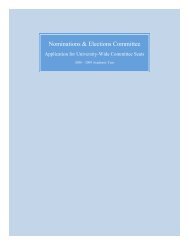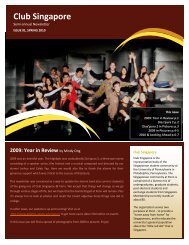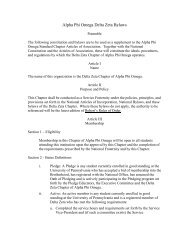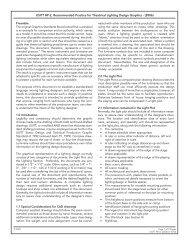Penn Philosophical Perspectives - University of Pennsylvania
Penn Philosophical Perspectives - University of Pennsylvania
Penn Philosophical Perspectives - University of Pennsylvania
- No tags were found...
You also want an ePaper? Increase the reach of your titles
YUMPU automatically turns print PDFs into web optimized ePapers that Google loves.
is not just a special case <strong>of</strong> when luck is morally relevant; it isthe only case. If agency is to make any sense, then people musteven if their identity is arbitrary, but especially because theiridentity is arbitrary. Luck is morally irrelevant when it is unrelatedto the formation <strong>of</strong> the agent’s identity and intentions.This leaves us with a view <strong>of</strong> moral responsibility thatcan sometimes take into account luck and sometimes ignore circumstantial, causes <strong>of</strong> action, and consequences <strong>of</strong> action.Luck with regard to the consequences that follow from an ac-tutiveluck will be the model sort <strong>of</strong> luck that will be relevantin determining moral responsibility. Luck in circumstances andcauses <strong>of</strong> action will sometimes be relevant. For example, taketwo cases <strong>of</strong> causal luck: if I kick someone because I slippedon a piece <strong>of</strong> ice, or if I kick someone because I saw someonecauses my action (I happened to slip on ice, I happened to seeseeing the person caused me to form an intention to kick. Thesetypes <strong>of</strong> luck will be relevant only when they are inherent to theprocess <strong>of</strong> identity formation or when they provide the circumstancesin which one can form intentions. can say in advance how the moral verdict will depend on theresults.” He gives the example <strong>of</strong> leaving the bath running witha baby in it, noting that the baby’s drowning makes what oneit may be rational to “concentrate moral assessment on theactual decision in light <strong>of</strong> the probabilities” but doesn’t fullymust await the outcome, because the outcome determines whathas been done.” In his discussion in the following pages, he-the same way. The outcome should never be relevant, becauseit is always divorced from intention (or lack <strong>of</strong> intention, asseen in the case <strong>of</strong> negligence). Thought <strong>of</strong> another way, actionsretrospectively. The irresponsible parentshould be equally morally responsible whether or not thebaby drowns. That our emotional reactions <strong>of</strong>ten don’t accordwith our moral judgment is not surprising; indeed, we regretevents in the past that cannot be changed, and sometimes feelshrinks down the notion <strong>of</strong> agency, I believe that he is wrong toinclude consequential luck in this contention. is right aboutthink this is because he takes it as a given that his four types<strong>of</strong> moral luck must be jointly relevant or irrelevant. Take, forexample, the following passage:January 2010The area <strong>of</strong> genuine agency, and therefore <strong>of</strong> legitimatemoral judgment, seems to shrink underthis scrutiny to an extension-less point. Every-<strong>Penn</strong> <strong>Philosophical</strong> <strong>Perspectives</strong> ence<strong>of</strong> factors, antecedent and posterior to action,that are not within the agent’s control. Sincehe cannot be responsible for them, he cannot beresponsible for their results.I do not think that genuine agency shrinks because <strong>of</strong> luck.In contrast, constitutive luck seems fundamental to who we are.intention and luck that occurs after the formation <strong>of</strong> an intentionare both outside <strong>of</strong> the agents’ control, I think there is a compellingcase for deeming only the former morally relevant. Finally,it does not follow from the fact that an agent is not responsiblefor something that he is not responsible for the results <strong>of</strong> thatthing. The responsibility may, like a stray cat wandering intoone’s house, assert itself upon someone. Identity asserts itselfcontrol <strong>of</strong>, one’s identity, but one is certainly responsible for theprojects that one chooses to undertake. something in the idea <strong>of</strong> agency is incompatible with actionsbeing events, or people being things,” but a theory <strong>of</strong> agencythat accounts for luck will have little trouble overcoming thisconceptual obstacle. If people are things, then their consciouslong as one maintains a conception <strong>of</strong> intention, events may be“leaves us with no one left to be,” but it may only be his consequentialluck that ought to be dismissed as morally irrelevant.Constitutive luck, in contrast, provides us with someoneto be. It is appropriate to hold people accountable for who theyprisinglythat our personalities and characteristics are basedon luck, might this be disappointingmanbeing, or, more strangely, that a particular conscious entitywe persist as a single identity in time, lucky that we can smell,taste, and touch the world, lucky that life contains pleasures,and lucky that we are not the only conscious beings. Luck isWorks Cited foot640x480.jpg Moral Luck. In Mortal QuestionsCambridge <strong>University</strong> Press, 1979.son01.jpgStrawson, P.F. Freedom and ResentmentDerk Pereboom. Indianapolis: Hackett PublishingCompany, 1997.22
















